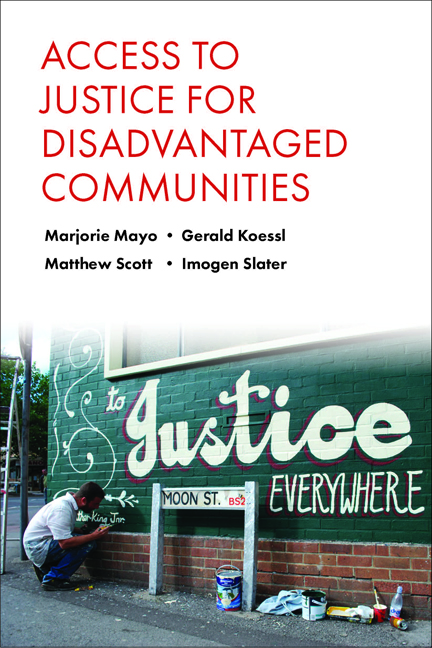Book contents
- Frontmatter
- Dedication
- Contents
- Acknowledgements
- Abbreviations and glossary
- Introduction: accessing social justice in disadvantaged communities
- one Social justice and the welfare state
- two Concepts of justice and access to justice
- three Ethos and values
- four Challenges and dilemmas
- five Public service modernisation, restructuring and recommodification
- six Conflict and competition versus collaboration and planning
- seven Public service modernisation and time
- eight Alienation and demoralisation, or continuing labours of love?
- nine Access to social justice for disadvantaged communities: value and values
- Appendix 1 Research methodology and questionnaire
- Appendix 2 Law Centres included
- Appendix 3 Topic guides for semi-structured interviews
- References
- Index
nine - Access to social justice for disadvantaged communities: value and values
Published online by Cambridge University Press: 01 February 2022
- Frontmatter
- Dedication
- Contents
- Acknowledgements
- Abbreviations and glossary
- Introduction: accessing social justice in disadvantaged communities
- one Social justice and the welfare state
- two Concepts of justice and access to justice
- three Ethos and values
- four Challenges and dilemmas
- five Public service modernisation, restructuring and recommodification
- six Conflict and competition versus collaboration and planning
- seven Public service modernisation and time
- eight Alienation and demoralisation, or continuing labours of love?
- nine Access to social justice for disadvantaged communities: value and values
- Appendix 1 Research methodology and questionnaire
- Appendix 2 Law Centres included
- Appendix 3 Topic guides for semi-structured interviews
- References
- Index
Summary
Access to justice was central to the principles upon which the post-war welfare state was established, as Chapter One explained, demonstrating the importance of Law Centres’ contributions to the provision of access to justice for all, regardless of the ability to pay. How, then, were public service modernisation agendas being experienced in this vitally important but relatively under-researched field? And what might be the wider implications for social justice agendas more generally?
As the Introduction explained, Law Centres were selected for study for a number of reasons, including the fact that they were offering precisely the access to information about rights and responsibilities that had been identified as centrally important to the public service modernisation agendas, agendas through which governments have been aiming to shift the balance of power and accountability from public service providers towards more active and informed citizens and service users. Were these policy agendas facilitating the development of new forms of professionalism? Or, conversely, were they being experienced as promoting new forms of de-professionalisation (Banks, 2004), demotivating, demoralising and potentially undermining the occupational values and identities of those involved in Law Centres’ work?
There are parallels here with wider debates. As Clarke and others have pointed out, public service modernisation has been posing major challenges as different aspects of the public realm have been subjected to processes of dissolution (Clarke, 2004). Although these processes have themselves been subjected to refusals and negotiations, as professionals and others have engaged in strategies of resistance, the extent to which they have been successful has been the subject of debate (Clarke, 2004; Kolthoff, Huberts and Heuvel, 2007), with continuing arguments about the ethical implications, and debates about the implications for professionalism in public services.
More specifically, in what ways were these changes being managed; what strategies were being adopted to cope with competing pressures and demands while maintaining professional ethical standards; how might strategies to respond to public service modernisation vary in differing settings; and what might be the implications for professional education and continuing professional development? There were issues here with potential relevance for debates on the future of the public service ethos and the future of the welfare state more generally.
- Type
- Chapter
- Information
- Access to Justice for Disadvantaged Communities , pp. 117 - 130Publisher: Bristol University PressPrint publication year: 2014



